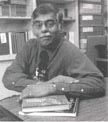Winter 2000, Volume 17.2
Poetry

S. Ramnath Mario
S. Ramnath works as an elementary school teacher. His poetry was recently anthologized in Heal Your Soul, Heal The World (Andrews McMeel Publishing, Kansas,1998) and in Bedside Prayers (Harper, San Francisco, 1997). Several of his works are among assigned readings in the Introduction to American Literature course at the University of Dresden, Germany.
At the Museum
I: Little Street
Mario felt the ennui that comes
from too much of one's own company,
too much of one's own conversation;
it seemed all real conversation was ensconced
in rooms he no longer knew how to open;
it seemed all real people belonged
to a different geography of soul.
Mario visited the museum
because his solitude sought company—
not the company of people,
or places full of conversation,
but the unchallenging company of people
simply passing through
from room to room—
dancing reflections in the water.
From the museum window Mario looked at Little Street :
a street where time moved without marking history,
a street where anonymous women performed anonymous tasks
as if in a nunnery—
and what about the absence of men, Mario thought,
men who put the bricks together, painted the windows green—
was it war in the land claimed them
or war with the queen?
The lady sitting at the door step, eyes on white wool,
what lies behind her quiet work and daily schedule,
what does she know about the dark, sinewy figures,
at the kitchen table, and their foul schemes?
My Love, look how the light shifts in the East,
from gold to charred black,
from Margarete to Shulamite.
And what is at peace
is the place between broken tiles,
a thought between two tragedies.
II: Room in New York, 1932
In another room, in another continent,
a young woman dressed in red,
turned her face away from her discontent husband,
to sound a note on the piano
large as Hiroshima,
and the sudden drama in the quiet household
took friends by surprise.
They seemed the ideal couple, said one,
perfect in every respect,
and Mario thought harmony and tranquility are dark horses,
de Chirico landscapes, with ominous shapes
lurking in the pale.
In a roiling, shifting universe,
the rock will fall
and break the lake's mirror.
If this be so, what about the futures, promises and contracts
we contemplate, thinking the sheen will hold?
No man steps into the river twice
holding on to the same philosophy;
and the river, it has no use
for any man's industry.
III: White Square on White
White on white.
Had someone seen God
in a quiet surrender of colors?
Is artlessness art,
innocence unsullied erudition—
is the picture that snow makes on snow
a long silence full of implications?
Mario watched a child
trail after her mother,
purpose and purposelessness wedded despite
the seeming disinterest of the other;
the child content
with the discovery of distractions,
the mother pushing aside distractions
to get to the root of the matter,
to arrive at a meaning of the picture
from her place behind the rope.
And Mario thought, the universe
tumbles and spins with a story
etched between silence and sound.
White on white:
does it signify an end,
or end significance?
Is white the color of speech
when speech won't come,
when heaven-yellow
and breeze-blue
prove inadequate, untrue,
as it did to Rothko
when he took the blade to his forearm?
Across from the "Broken Obelisk"
inside the low building
the final colors for Rothko were
black, deep maroon and raw umber;
a wisp of sunshine reaching for
the tortured, departing hand
failed to make the end connection.
What is it that I seek, Mario asked himself.
Mario looked at the child still playful among the distractions
and thought about the songs of childhood that move with prism eyes,
the leap of continents accomplished with little exertion,
the white of God's eyes revealed in play.
IV: On the Threshold of Liberty, 1937
The matter of our looking, in the glass
or in the real world, matters not, Mario thought,
because the compass of our lives spins from one truth to the next,
and what comes to pass vexes our thoughts
unless we accept islands floating in the sky.
A young woman jumped off a bridge in Châtelet because
the slippage between life and what it ought to be
invited the cold waters of the river Sambre
to perform their ministry.
If only she could have seen
what the young boy saw at thirteen:
a room full of screens,
images of sky, fire, nude, facade,
susceptible any second
to be blows to smithereens.
So, shall we proceed cautiously, between the pictures,
Mario asked himself;
between the here and now,
shall we try to catch the light just so,
at just such and such an angle,
or shall we run around the corner
to a single delight,
even if it be perched in the mouth of the cannon?
And what if
the object we seek
turns out to be an invincible freak, a phantom
leading us on a chase through dark corridors, dark streets?
Ceci n'est pas une pipe, the artist warned.
There is truth in the matter of our looking, Mario thought,
and then perhaps, a larger truth
in the matter of our not looking.
